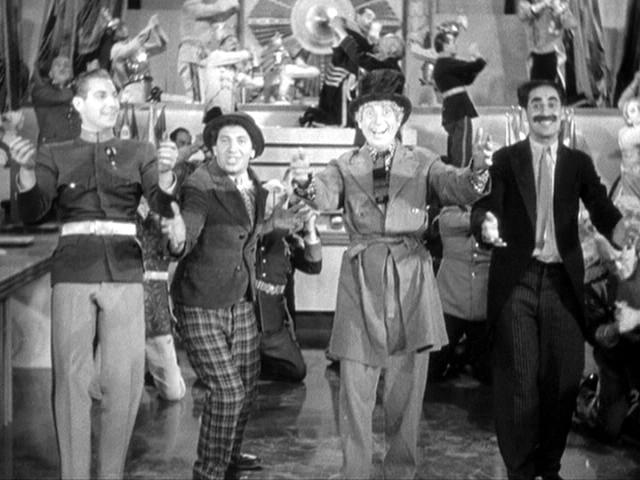Written for The Unquiet American: Transgressive Comedies from the U.S., a catalogue/ collection put together to accompany a film series at the Austrian Filmmuseum and the Viennale in Autumn 2009. — J.R.

DUCK SOUP (1933)
Many reasons could be cited why this is the best of all
the Marx Brothers features, even though it was a
commercial disappointment when it was first released
in 1933. The last of the Marx Brothers movies in
which Zeppo -– the straight man among the brothers
and the youngest (who replaced Gummo, the one
who fulfilled this role on stage) –- appeared, it is perhaps
the only one whose anarchistic pleasures aren’t
crippled or interrupted by romantic and musical
interludes. (The climactic musical number here,
“Freedonia’s Going to War,” is an integral part of the
action.) Leo McCarey was inarguably the best director
the brothers ever worked with, and the ridiculing
of both nationalism and patriotism is more pointed
than most of their other satires. This comedy
also has the most beautiful (and beautifully abstract)
sequence in any Marx brothers picture, staged in
front of a mirror, developing a gag concept from
Chaplin’s The Floorwalker (1916) and extending it
to hallucinatory proportions. It also includes the
second and possibly best appearance of Margaret
Dumont (Groucho’s ideal foil) in a Marx Brothers
picture, and also features Edgar Kennedy and Louis
Calhern in memorable parts. Read more
This piece by Ehsan for Fandor’s Keyframe originally appeared on the day before my 70th birthday (February 26, 2013).– J.R.

Jonathan Rosenbaum at 15, imagination in the process of being liberated.
Jonathan Rosenbaum, at the cusp of seventy, talks about a life of jazz and cinema.
By Ehsan Khoshbakht February 26, 2013
The needs-no-introduction film critic Jonathan Rosenbaum turns seventy this month, but that does not mean that he has grown out of touch. His latest book, Goodbye Cinema, Hello Cinephilia (University Of Chicago Press, 2010), displays Rosenbaum’s engagement with digital-era realities, and manages something few if any critics of his generation are capable of in the current environment: optimism. Self-catalogued on his own website, the critic’s life of writing, from his late teens to the two-thousand-and-teens, coheres, and the collection of work is unmatched by any living film writer for its breadth and rigor. A closer look at his contribution to film literature (with featured articles in the weightiest of magazines and translations of his baker’s dozen books into languages as diverse as Chinese and Farsi) finds Rosenbaum generally bringing a sense of urgency to his subjects, no matter the decade.
My rather personal ties with the Chicago-based critic comes from our mutual love of jazz, which, aside from its ecstatic pleasures (that sometimes surpasses cinema’s), can assist writers in the ways they approach any other art form. Read more
Written in November 2017 for my “En movimiento” column in Caimán Cuadernos de Cine. — J.R.
En movimiento: The Crimes of Harvey Weinstein
Although we routinely assume that social trends have a rational basis, the processes by which irrational forms of displacement also affect those trends are no less routinely ignored. For instance, it’s commonly thought that the Watergate scandal leading to Richard Nixon’s resignation as U.S. President was merely a matter of exposing his crimes, but it could also be argued that many of these crimes were already evident to U.S. citizens before Nixon won his last Presidential election. As Mary McCarthy would later theorize, it was because the public needed a scapegoat for the U.S. debacle in Vietnam that the Watergate crimes belatedly became important. And one might similarly theorize that the recent public exposure and condemnation of producer-distributor Harvey Weinstein as a sexual predator, which has led to many similar exposures of predatory sexual behavior by others in the film world (such as James Toback and Kevin Spacey) as well as in separate fields, has been a displaced response to the debacle of Donald Trump’s Presidency, not to mention his own primitive sexual politics, which were exposed by the release of a private tape during the Presidential campaign. Read more


